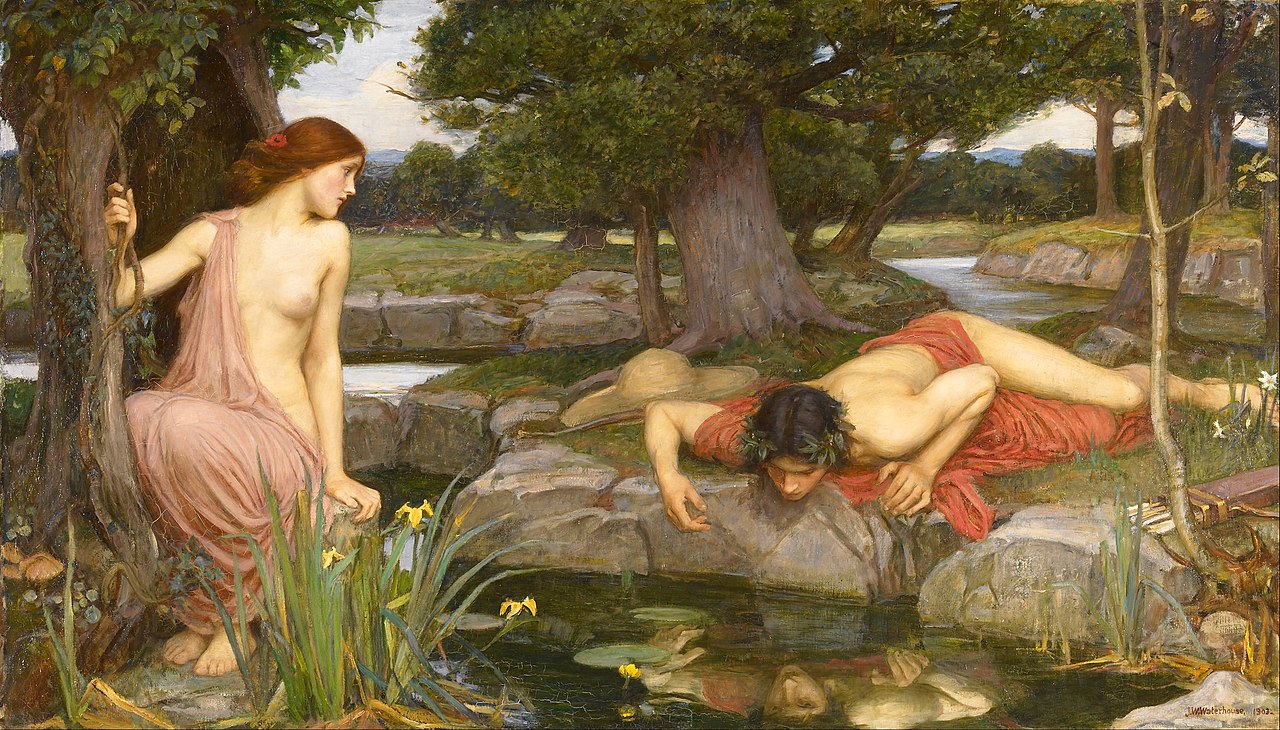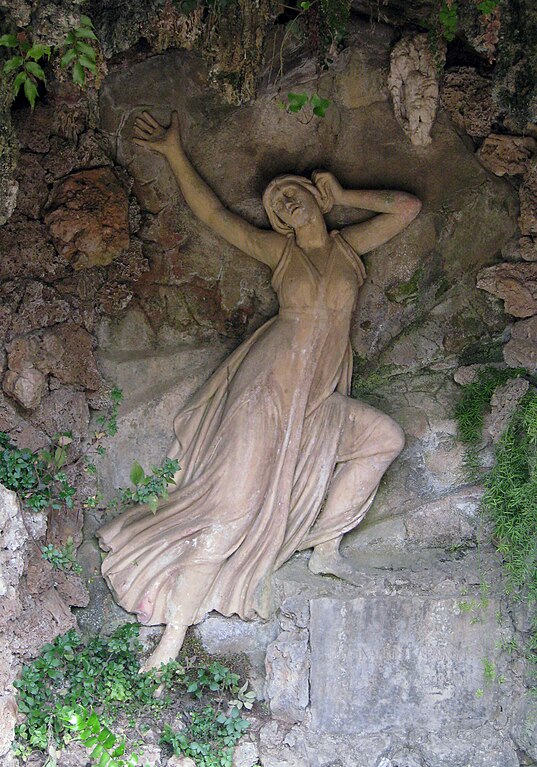Unit 5: Love and Metamorphosis

Before You Read: About Ovid
This unit is about love and metamorphosis. The word metamorphosis means to change completely, or to transform. Around the year 8 CE, a Roman poet named Ovid wrote a huge collection of poems called The Metamorphoses, containing 250 short stories that have become famous classics in Greek mythology. They are some of the most well-known stories in Western culture and have inspired art, music, language, and modern culture ever since.
Echo and Narcissus
Adapted from The Age of Fable, or Stories of Gods and Heroes by Thomas Bulfinch, $\ccpd$
Echo was a beautiful nymph, fond of the woods and hills, where she devoted herself to the forest. She was a favorite of Diana and attended her while hunting. But Echo had one flaw: she was fond of talking, and whether in chat or argument, would have the last word. One day Juno was seeking her husband, who, she had reason to fear, was amusing himself among the nymphs. Jupiter had Echo distract the goddess until the nymphs made their escape by striking up a long conversation. When Juno discovered what was going on, she cursed Echo: “You shall surrender the use of that tongue with which you have cheated me, except for that one purpose you are so fond of — reply. You shall still have the last word, but no power to speak first.”
One day, this nymph saw Narcissus, a beautiful youth, as he was hunting upon the mountains. He was unaware of the words of Tiresias, the most famous prophet, given to his parents when he was born. Being consulted as to whether the child would live a long life, the prophet replied, “If he does not discover himself.” Echo discovered him and instantly fell in love with him and followed his footsteps. Oh how she longed to address him in the softest voice, and have the chance to speak with him, to confess her love to him! But it was not in her power. She waited with impatience for him to speak first and had her answer ready.

One day the youth, being separated from his companions, noticed something rustling in the bushes and shouted, “Who’s here?” Echo replied, “Here.” Narcissus looked around, but seeing no one called out, “Come.” Echo answered, “Come.” As no one came, Narcissus called again, “Why are you ignoring me?” Echo asked the same question. “Let us join one another,” said the youth. Echo answered with all her heart in the same words, and hastened to the spot, ready to throw her arms around his neck. He started back, yelling, “Hands off! I would rather die than you touch me!” “Touch me,” said she; but it was all in vain. He left her, and she went to hide her embarrassment in the deep woods. From that time forth she lived in caves and among mountain cliffs. Her form faded with grief, until at last all her flesh shrank away. Her bones were changed into rocks and there was nothing left of her but her voice. With that she is still ready to reply to anyone who calls her and keeps up her old habit of having the last word.
Narcissus’ cruelty in this case was not the only instance. He shunned all the rest of the nymphs, as he had done poor Echo. One day another girl who had in vain tried to attract him but also got rejected whispered a prayer that he might some time or other feel what it was to love and meet no return of affection. The avenging goddess Nemesis heard and granted the prayer.

There was a clear fountain, with water like silver, where grass grew fresh around it. One day the youth came to this fountain, tired from hunting, heated and thirsty. He bent down to drink and saw his own image in the water; he thought it was some beautiful water-spirit living in the fountain. He stood gazing with admiration at those bright eyes, a face with hair curled like the hair of Bacchus or Apollo, the rounded cheeks, the parted lips, and the glow of health and exercise. He fell in love with himself. He brought his lips near to take a kiss; he plunged his arms in to embrace the beloved object. It fled at the touch but returned again after a moment and renewed his fascination.
He could not tear himself away; he lost all thought of food or rest, while he hovered over the edge of the fountain gazing upon his own image. He talked with the supposed spirit:
“Why, beautiful being, do you ignore me? Surely my face is not one to disgust you. The nymphs love me, and you yourself look not indifferent upon me. When I stretch forth my arms you do the same; and you smile upon me and answer my calls likewise.” His tears fell into the water and disturbed the image. As he saw it depart, he exclaimed, “Stay, I beg you! Let me at least gaze upon you, if I may not touch you.” With this, and much more of the same kind, he stayed at the waters, so long that he lost his color, his energy, and the beauty which formerly had so charmed the nymph Echo.

His strength diminished and he died; and when his spirit passed the Styx River, it leaned over the boat to catch a look of itself in the waters. The nymphs mourned for him, especially his sisters, the water-nymphs. They prepared a funeral and would have burned the body, but it was nowhere to be found; but in its place was a yellow flower which bears the name and preserves the memory of Narcissus.
Vocabulary from the Story
We get several words from this story. Find the definition of the words below. How do they relate to the characters in the story?
|
character from the story |
vocabulary |
definitions |
|
Narcissus |
narcissus |
|
|
narcissism |
||
|
narcissist |
||
|
narcissistic |
||
|
narcotic |
||
|
narcolepsy / narcoleptic |
||
|
echo |
Comprehension Questions
Answer the following questions according to the reading.
- Why does Juno (Hera) punish Echo?
- What punishment does Juno give Echo?
- Who punishes Narcissus, and why? (Her name should be familiar.)
- What is Narcissus’ punishment?
- In this version of the story, how does Narcissus die?
Critical Thinking Questions
Answer the following questions. Compare your answers with a partner.
- What is the meaning and significance of Tiresias’ prophecy about Narcissus?
- Do you think Narcissus is gay or bisexual? Explain why or why not.
- Give examples of narcissistic behavior.
- This story was written in Ovid’s “The Metamorphoses”. Metamorphosis means to change. A lot of his stories are explanations of changes in nature. What 2 things does he try to explain in this story?
Analyzing Cultural Images
CEFR Level: CEF Level Low B2

